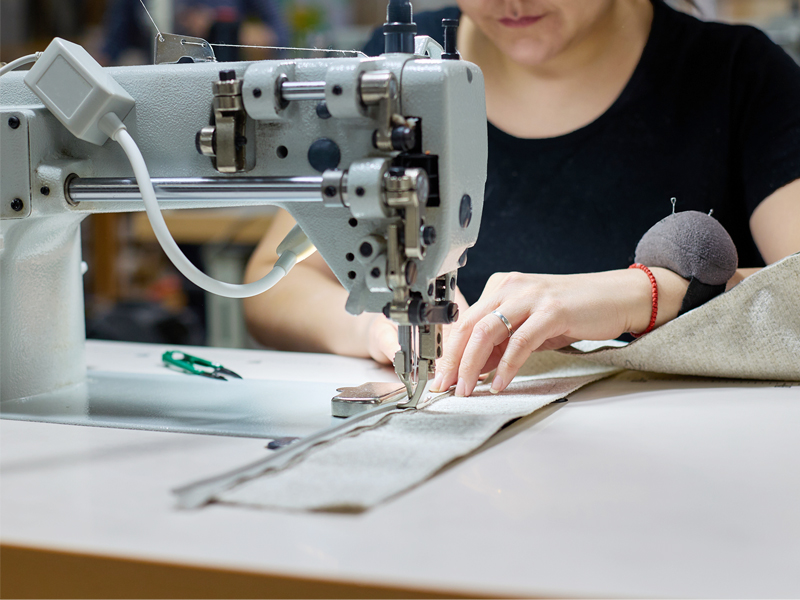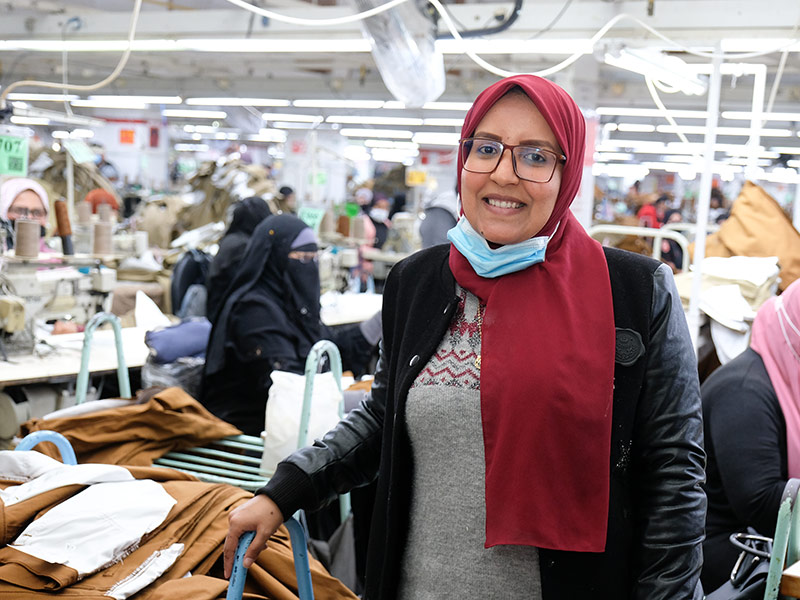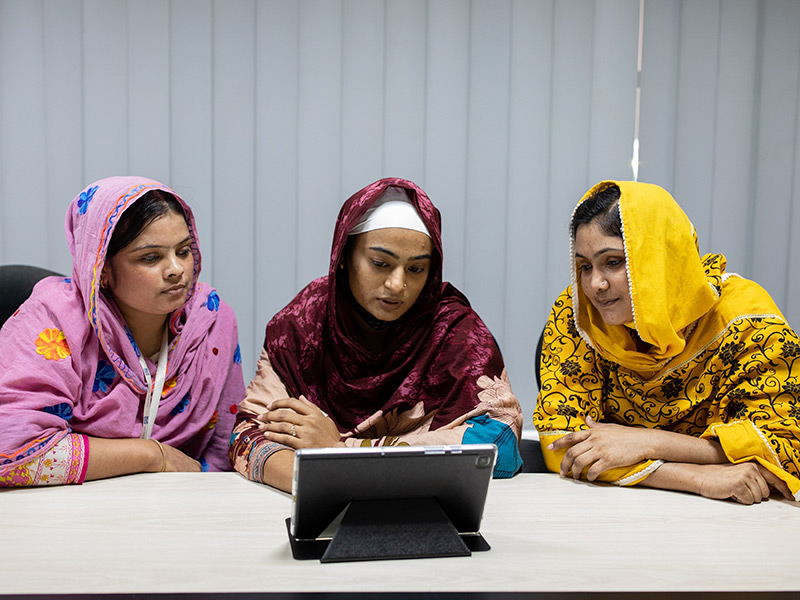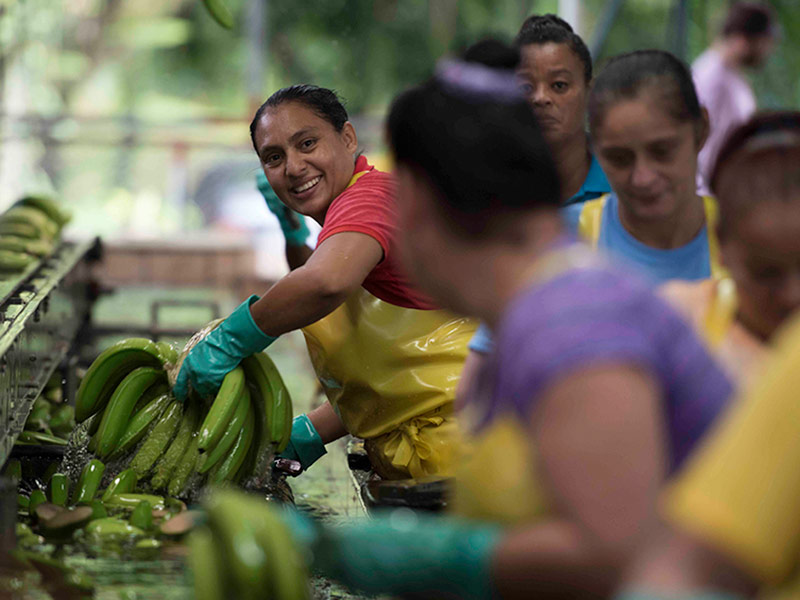
Authors
-
Annelise Thim
Former Associate Director, BSR
-
Aditi Mohapatra
Former Managing Director, BSR
“Stronger engagement on gender equality is key to a sustainable global recovery from the COVID-19 crisis and building fairer, more inclusive, more prosperous societies. Women and girls are in the frontline of the pandemic and must be put in the driving seat of the recovery.”
In this statement, Jutta Urpilainen, EU Commissioner for International Partnerships, stresses the vital importance on the role of women in both responding to the COVID-19 pandemic and its economic recovery. Indeed, women will be key to the economic recovery from COVID-19, in part because they have been the hardest hit.
As early as April 2020, news investigations raised the alarm over the disproportionate impact of COVID-19 on women and their economic prospects. As the months went on, the pandemic continued to spread, governments imposed lockdowns, schools stayed closed, and more workers lost their jobs—the economic crisis caused by COVID-19 grew into a full blown “she-cession” that companies cannot afford to ignore.
Women Have Suffered Disproportionately due to COVID-19
Women make up the majority of workers in “frontline” sectors, including retail, health, K-12 education, and paid care. Many of these workers are in precarious situations with inadequate health and safety measures, putting themselves and their families at risk. In other sectors, women have experienced higher levels of job losses, either being let go or leaving to manage childcare.
In the U.S., women account for 53.6 percent of overall net job losses since the beginning of the pandemic, with Black and Latina women facing even higher unemployment rates. In Europe, the job loss rate for women is 1.8 times greater than that of men. Low-income women and women in rural settings in Latin America are more likely to be unable to work or go out during the pandemic. Similar trends can be seen around the world in countries such as Brazil, South Africa, and India.
COVID-19 is likely to have long-lasting impacts on women’s economic participation: the poverty rate among women in Europe is expected to go up by 1.9 percent. In the U.S., nearly 40 percent of unemployed women have been out of work for six months or longer. In addition, the jobs that are coming back are not going to women; this is true even in female-dominated sectors like retail, leisure, and hospitality.
Job losses are not the only negative impacts women face. In the U.S., France, and the U.K., incidents of domestic abuse increased by 25-36 percent following the first confinement. Globally, domestic violence is expected to soar by 20 percent globally during lockdowns.
What’s more, around 70 countries have reported issues delivering family planning services during the pandemic. Marie Stopes International, which provides family planning services in 37 countries, estimates that nearly two million fewer women received birth control services between January and June of 2020.
Building Back Better—with Women in Mind
As governments and businesses begin to develop and enact plans for rebuilding, they need to incorporate an intentional gender lens on recovery efforts. Without this lens, we run the risk of undoing the decades of progress that we have made towards women’s economic empowerment and gender equality.
So far, both the European Union and the U.S. state of Hawaii have already decided to put women at the center of their recovery. This holds enormous potential to help families and communities rebuild, as women invest more in their children’s education and health and put more of their income back into their local community. Thus, targeted programs and policies, including paid leave, equal pay, addressing gender bias in hiring, and others that support gender equality and women’s empowerment, are more important than ever.
BSR believes the six actions listed below are steps companies can take to ensure a gender-responsive approach to building back better.
- Make flexible work options the norm so that all employees of all genders can balance their professional and personal responsibilities. This includes teleworking, reduced working hours and part-time schedules, flexible working hours, compressed work weeks, and role sharing, among others. For example, Mars, as part of their new “Full Potential” platform, has committed to advancing their approach to flexible work beyond the pandemic. These options will not be feasible for all roles, many of which are the hardest hit by the pandemic (retail, health, and care), so companies will need to consider other options to support women as listed below.
- Consider re-entry programs, mentorship, and training for women who have been out of the workforce for an extended period. This should also include skills development to support employees to transition to more tech-based models of working. IBM is expanding its “returnship program” to hire and train women who have had to step back from employment during the pandemic, while Verizon retrained 8,000 workers to work remotely when stores were shut down and has allowed some of those employees to continue working remotely or part-time even when stores reopened.
- Encourage men to do their share of unpaid care work through awareness-raising campaigns, providing paid paternity and care leave, and supporting men who choose to take leave for care responsibilities. Initiatives such as the Parental Leave Taskforce, founded by Dove Men+Care and Promundo, and PL+US are championing access to parental leave for dads everywhere. Their latest report highlights the significant challenges facing employees who lack paid leave and provides recommendations for the private and public sector to better meet the needs of businesses and employees in a post-pandemic world.
- Support survivors of domestic violence to access the services and support they need. Offer paid leave for victims of domestic violence, relocation options, and information about local services. Avon and its parent company, Natura &Co, have partnered on #IsolatedNotAlone, a campaign that aims to raise awareness of the issue, provides resources, and calls on governments to take action.
- Remember that the impacts of COVID-19 are not the same for all women and take an intersectional approach when designing policies and programs. This includes considerations for LGBTIQ+ women, women of color, and women with disabilities. Companies looking to expand or strengthen their Diversity, Equity, and Inclusion programs should consider these recommended actions to take intersectionality into account.
- Advocate for a gender-responsive recovery that reaches the most vulnerable. To work toward solutions that are more systemic and comprehensive, companies can work with peers and through trade organizations to ensure a gender lens is placed on recovery efforts, including investments in care infrastructure, preventing and responding to increased gender-based violence, and promoting greater equality for all women. This will be particularly important to reach the 190 million women in global supply chains who face additional risks, for example, related to lack of access to contraception and extreme financial insecurity.
Later this year, the Generation Equality Forum will offer a once-in-a-generation opportunity for business, governments, and civil society organizations from across the globe to co-create an actionable roadmap to achieve gender equality by 2030.
The Forum will discuss the range of gender equality challenges laid bare by the pandemic, such as economic justice and technology for women and girls, as well as issues that remain critical to address, including climate justice and sexual and reproductive health. BSR, in collaboration with The B Team and Women Win/Win-Win Strategies, is excited to work with our members to catalyze meaningful commitments and action as part of this milestone gathering. Join us on March 2 for a webinar to learn about how business can contribute to the success of this landmark moment.
Topics
Let’s talk about how BSR can help you to transform your business and achieve your sustainability goals.







